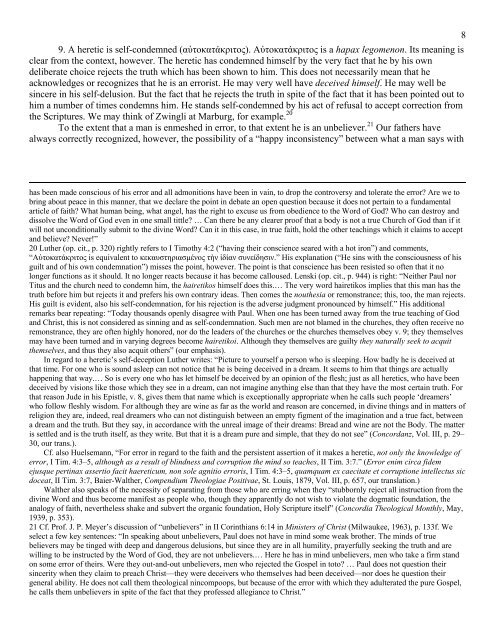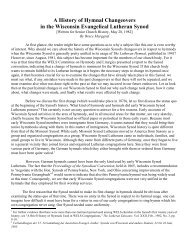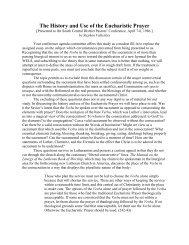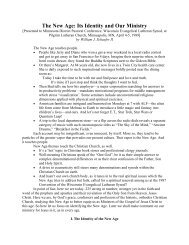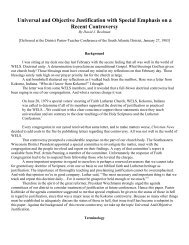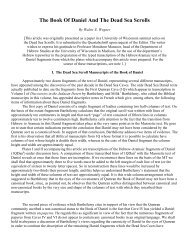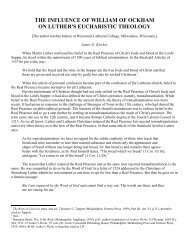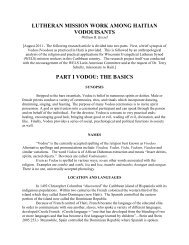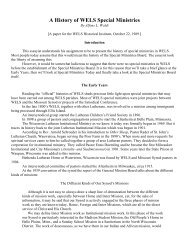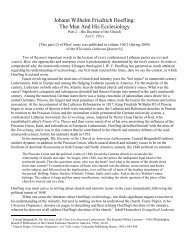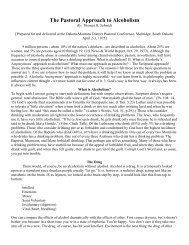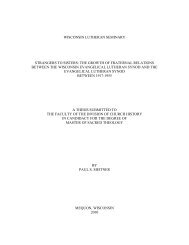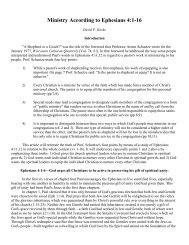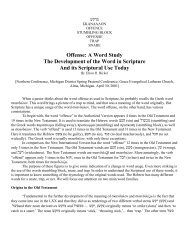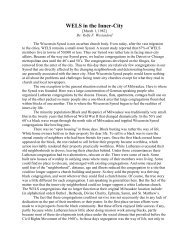What Is Heresy? - Wisconsin Lutheran Seminary Library: Essays
What Is Heresy? - Wisconsin Lutheran Seminary Library: Essays
What Is Heresy? - Wisconsin Lutheran Seminary Library: Essays
You also want an ePaper? Increase the reach of your titles
YUMPU automatically turns print PDFs into web optimized ePapers that Google loves.
8<br />
9. A heretic is self-condemned (αὐτοκατάκριτος). Αὐτοκατάκριτος is a hapax legomenon. Its meaning is<br />
clear from the context, however. The heretic has condemned himself by the very fact that he by his own<br />
deliberate choice rejects the truth which has been shown to him. This does not necessarily mean that he<br />
acknowledges or recognizes that he is an errorist. He may very well have deceived himself. He may well be<br />
sincere in his self-delusion. But the fact that he rejects the truth in spite of the fact that it has been pointed out to<br />
him a number of times condemns him. He stands self-condemned by his act of refusal to accept correction from<br />
the Scriptures. We may think of Zwingli at Marburg, for example. 20<br />
To the extent that a man is enmeshed in error, to that extent he is an unbeliever. 21 Our fathers have<br />
always correctly recognized, however, the possibility of a “happy inconsistency” between what a man says with<br />
has been made conscious of his error and all admonitions have been in vain, to drop the controversy and tolerate the error? Are we to<br />
bring about peace in this manner, that we declare the point in debate an open question because it does not pertain to a fundamental<br />
article of faith? <strong>What</strong> human being, what angel, has the right to excuse us from obedience to the Word of God? Who can destroy and<br />
dissolve the Word of God even in one small tittle? … Can there be any clearer proof that a body is not a true Church of God than if it<br />
will not unconditionally submit to the divine Word? Can it in this case, in true faith, hold the other teachings which it claims to accept<br />
and believe? Never!”<br />
20 Luther (op. cit., p. 320) rightly refers to I Timothy 4:2 (“having their conscience seared with a hot iron”) and comments,<br />
“Αὐτοκατάκριτος is equivalent to κεκαυστηριασμένος τὴν ἰδίαν συνείδησιν.” His explanation (“He sins with the consciousness of his<br />
guilt and of his own condemnation”) misses the point, however. The point is that conscience has been resisted so often that it no<br />
longer functions as it should. It no longer reacts because it has become calloused. Lenski (op. cit., p. 944) is right: “Neither Paul nor<br />
Titus and the church need to condemn him, the hairetikos himself does this.… The very word hairetikos implies that this man has the<br />
truth before him but rejects it and prefers his own contrary ideas. Then comes the nouthesia or remonstrance; this, too, the man rejects.<br />
His guilt is evident, also his self-condemnation, for his rejection is the adverse judgment pronounced by himself.” His additional<br />
remarks bear repeating: “Today thousands openly disagree with Paul. When one has been turned away from the true teaching of God<br />
and Christ, this is not considered as sinning and as self-condemnation. Such men are not blamed in the churches, they often receive no<br />
remonstrance, they are often highly honored, nor do the leaders of the churches or the churches themselves obey v. 9; they themselves<br />
may have been turned and in varying degrees become hairetikoi. Although they themselves are guilty they naturally seek to acquit<br />
themselves, and thus they also acquit others” (our emphasis).<br />
In regard to a heretic’s self-deception Luther writes: “Picture to yourself a person who is sleeping. How badly he is deceived at<br />
that time. For one who is sound asleep can not notice that he is being deceived in a dream. It seems to him that things are actually<br />
happening that way.… So is every one who has let himself be deceived by an opinion of the flesh; just as all heretics, who have been<br />
deceived by visions like those which they see in a dream, can not imagine anything else than that they have the most certain truth. For<br />
that reason Jude in his Epistle, v. 8, gives them that name which is exceptionally appropriate when he calls such people ‘dreamers’<br />
who follow fleshly wisdom. For although they are wine as far as the world and reason are concerned, in divine things and in matters of<br />
religion they are, indeed, real dreamers who can not distinguish between an empty figment of the imagination and a true fact, between<br />
a dream and the truth. But they say, in accordance with the unreal image of their dreams: Bread and wine are not the Body. The matter<br />
is settled and is the truth itself, as they write. But that it is a dream pure and simple, that they do not see” (Concordanz, Vol. III, p. 29–<br />
30, our trans.).<br />
Cf. also Huelsemann, “For error in regard to the faith and the persistent assertion of it makes a heretic, not only the knowledge of<br />
error, I Tim. 4:3–5, although as a result of blindness and corruption the mind so teaches, II Tim. 3:7.” (Error enim circa fidem<br />
ejusque pertinax assertio facit haereticum, non sole agnitio erroris, I Tim. 4:3–5, quamquam ex caecitate et corruptione intellectus sic<br />
doceat, II Tim. 3:7, Baier-Walther, Compendium Theologiae Positivae, St. Louis, 1879, Vol. III, p. 657, our translation.)<br />
Walther also speaks of the necessity of separating from those who are erring when they “stubbornly reject all instruction from the<br />
divine Word and thus become manifest as people who, though they apparently do not wish to violate the dogmatic foundation, the<br />
analogy of faith, nevertheless shake and subvert the organic foundation, Holy Scripture itself” (Concordia Theological Monthly, May,<br />
1939, p. 353).<br />
21 Cf. Prof. J. P. Meyer’s discussion of “unbelievers” in II Corinthians 6:14 in Ministers of Christ (Milwaukee, 1963), p. 133f. We<br />
select a few key sentences: “In speaking about unbelievers, Paul does not have in mind some weak brother. The minds of true<br />
believers may be tinged with deep and dangerous delusions, but since they are in all humility, prayerfully seeking the truth and are<br />
willing to be instructed by the Word of God, they are not unbelievers.… Here he has in mind unbelievers, men who take a firm stand<br />
on some error of theirs. Were they out-and-out unbelievers, men who rejected the Gospel in toto? … Paul does not question their<br />
sincerity when they claim to preach Christ—they were deceivers who themselves had been deceived—nor does he question their<br />
general ability. He does not call them theological nincompoops, but because of the error with which they adulterated the pure Gospel,<br />
he calls them unbelievers in spite of the fact that they professed allegiance to Christ.”


